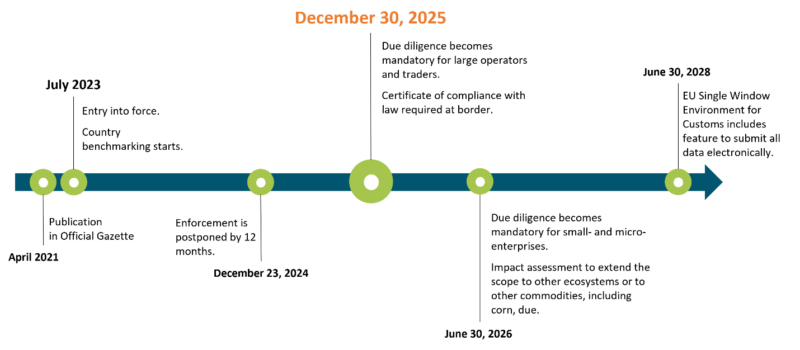This first-of-its kind law turns market-led sustainability initiatives into mandatory due diligence requirements for commodities contributing to deforestation, climate change, and biodiversity loss. For food companies, this means, for the first time, they must carry out in-depth and traceable due diligence checks to identify any risks of deforestation in their supply chains before placing their products into the EU market. Products will be prohibited from being sold in the EU or exported from the EU if due diligence reveals they were produced on land converted from forest to farmland after December 31, 2020, or if their primary ingredients were fed with or made using such products. On October 1, after receiving many letters and criticism from global partners, the EU Commission finally tabled a proposal to postpone the enforcement to December 30, 2025 for large companies, and to June 30, 2026 for small and micro-enterprises. EU Parliament and Council fast-tracked their debates to create certainty around enforcement and compliance dates, and the revised timeline for enforcement was officially published on December 23, 2024.

Current commodity scope
Food commodities currently in scope of the law are soy, beef, palm oil, coffee, and cocoa as they are considered main contributors to deforestation and biodiversity loss. With low conversion rates of forest land into agricultural land in the U.S., this law could offer a real competitive advantage for U.S. soy and beef when compared to other suppliers.
Key implications for affected commodities and companies:
- Origin markets will be classified as low-risk, standard, or high-risk by the European Commission based on a benchmarking process. Due diligence requirements will vary with the sourcing or producing region’s risk profile and compliance checks will be risk-based.
- The new law triggers demands by European importers and distributors for information related to upstream production. Products with a risk of non-compliance that is non-negligible will be barred from the EU market.
- Certificates of compliance – required at the border – will require traceability to the exact GPS coordinates of the production plot and verifiable information that the product is deforestation-free and compliant with all relevant domestic laws.
- A non-compliant EU operator or trader may face fines as high as 4% of their total annual EU-wide turnover.
Companies will also be required to collect precise geographical information on the farmland where the commodities that they source have been grown, so that these commodities can be checked for compliance.” (European Commission’s press release from December 2022)
Global Developments since Entry into Force of the EUDR
The law makes the EU the first region in the world to launch mandatory due diligence requirements to prevent deforestation associated with products placed on its market. This law is now complemented by an OECD-FAO Business Handbook on Deforestation and Due Diligence in Agricultural Supply Chains, published in July 2023. Further, under its G7 Presidency, Germany collaborated with the OECD to compile an inventory and comparative overview of voluntary and mandatory due diligence measures in G7 countries and the EU to address environmental and social risks in global agricultural supply chains. On the other hand, the United Kingdom has still to officially start drafting the necessary secondary legislation to implement their Forest Risk Commodity Regulation (UKFRC). So far the UK Government only made an official statement about to the scope of the regulation in December 2023. According to the statement, the initial regulations shall focus on four key commodities – non-dairy cattle products, cocoa, palm oil, and soy. The regulations shall apply to larger businesses with a global annual turnover of £50m or more, with those using 500 tons or less of these commodities being eligible for exemptions. Enforcement will include a range of sanctions, with penalties reaching unlimited amounts for serious breaches. Interestingly, coffee is not in scope of the UK regulation, while it is in scope for imports by the EU.
Meeting the important goals of sustainability while providing an adequate supply of nutritious food is a worthy but daunting challenge not only for farmers around the world, but for the whole global food value chain. BCI monitors global regulatory announcements daily and has eyes on impactful draft regulations as they move from the distant policy horizon to implementation in your business. If staying on top of global regulatory developments is a challenge, we would like to hear from you. Please let us know at bci@bryantchristie.com.
For more on global export news, insights and information please visit Bryant Christie Inc’s website, sign up for our e-newsletter and follow us on LinkedIn and Twitter.

